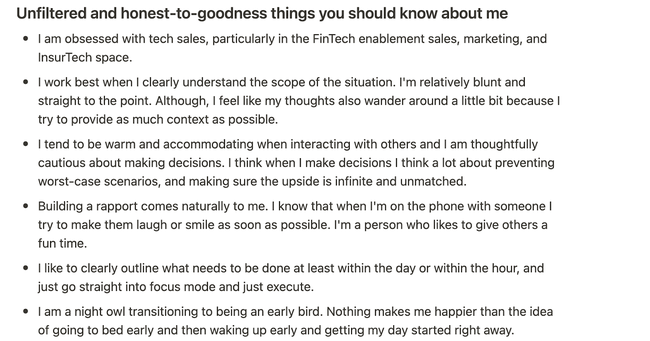Applying to what appears to be your dream job?
Your palms are probably sweaty and you are all giddy with excitement. But also a bit worried about how you could stand out in a sea of job hunters.
If other applicants have similar hard skills or competencies as you, you’ll want to do everything you can to keep your resume on the top of the pile. How? You can try sprinkling in several “interesting facts about me” to catch the reader’s attention.
What Are Some Good Things to Put on a Resume?
A resume is a one-page presentation of your skills, competencies, professional credentials, and personality traits. Effectively, it shows what type of work you can do (and how well!), plus what kind of a worker you are — independent or strong team player, strong communicator, or analytical thinker.
Remember: Recruiters rank soft skills as important (and sometimes even more so) than your hard skills like job-specific knowledge or proficiency with specific software. The latter can be easily taught, but the former are much harder to nurture.
Hence, apart from listing your core competencies and past accomplishments, consider adding more personified things to your resume like your:
- Preferred work style & work culture
- Values, morals, and ethics principles
- Awards and recognitions
- Hobbies and interests
- Volunteering activities
- Speaking appearances
- Professional development activities
- Study abroad experiences
By sharing interesting facts about yourself, you help the employer paint a more comprehensive picture of you as a person and determine if you’d be a good fit for their organization.
6 Unique Things to Put on a Resume (with Examples!)
When strategically incorporated into your resume summary or LinkedIn profile, personal facts about yourself help create a more memorable first impression. You get to demonstrate both your skills and your personality, which is a strong “selling point” in customer-facing, creative, and managerial roles among others.
That said, If you’re job hunting in a conservative industry, say law or accounting, going against the protocol and adding too many fun facts on a resume makes you look frivolous or downright unprofessional.
But if you’re in a more creative industry, you can draw attention to yourself with more unusual or creative fun facts about me.
Here are some ideas you can implement in our 100% free resume builder.
1. Proudest Non-Job-Related Accomplishment Or Skill
Listing your professional accomplishments on your resume is a given. But as everyone does this, your resume can get stale quickly.
To stand out, include an interesting fact that’s not directly related to the job. Think of it as an “easter egg,” like in a movie or video game.
For example, here are some fun facts to put on a resume for a sales position:
- “I once bonded with a client over our love for obscure Japanese Hokkus, which helped me later close a $500K deal with them.”
- “At home, I have a vintage collection of Liberty London scarves, inherited from my Grandmother, which makes me one of the best connoisseurs in Liberty patterns and the favorite salesperson on the floor.”
- “In college, I worked as a mechanic. So when our car broke down before an important client meeting, I fixed it in no time and we made it on time.”
Embrace what’s unique about you, but keep in mind it’s best not to include “hot” topics like politics or religion. Unless, of course, they relate to your industry and you are certain the pun will land.
2. Explain Your Work Style
Add a quick preview of what it would be like working with you. After all, determining if you’re a good cultural fit is the point of all those interview rounds.
Some interesting things to add to your resume in this category could be your:
- Preferred project management style
- Work rituals to get productive
- If you are a morning or evening person
- Preferred communication channels
For example, Account Executive Liz Strong created an entire manual, explaining her strengths, communication style, and managerial preferences in a fun and professional manner.

If you want to go with a condensed version for your resume or LinkedIn profile, you can include a quick, personalized statement in your resume summary. Here’s an example for a hostess resume:
High-energy hostess, experienced in showing the best of Southern Hospitality (I’m originally from rural Alabama). I feel productive and inspired when I work directly with people. As a night owl, I don’t mind taking extra night shifts.
And here are some other fun facts to put on your resume to better describe your work style:
- Your go-to Spotify tune or playlist for getting into deep work
- A favorite personal productivity hack
- Or a reference to a productivity guru
For example:
I start every day with Hal Elrod’s Miracle Morning Life SAVERS to get into the right mindset.
3. The First Job You Wanted As A Kid
“What do you want to be when you grow up?” You probably heard that question more times than you can count. Maybe you were born knowing what you were meant to do – and this resume will get you there.
Maybe you wanted to be something off the wall, like a space-traveling artist. It takes all types, you know!
Mentioning your childhood job aspirations is a good way to:
- Compare and contrast your childhood dream and your current dream job
- Highlight your creativity and inner spark
- Show that you’ve always known who and what you wanted to be
This can also help segue into an explanation if you’re changing careers.
For example, you can add something like this to your resume summary or cover letter:
As a child, I dreamed of running my family’s vineyard. That helped me discover my love of writing for the wine industry.
4. Your Role Model Or Person You Admire
Talking about a person you admire is an unconventional, but useful icebreaker. After all, we hope to become reflections of our heroes. It can be a great tool for standing out and illustrating that you are a unique and thoughtful individual.
In a similar vein, you can also mention:
- A mentor who changed your life
- An industry figure you are following
But if you include this fact in your resume, be prepared to further explain your choice in an interview.
5. Volunteering Experiences
Did you know that people with volunteering experience on a resume have a 27% higher chance of finding a job?
That’s right, many employers see skilled volunteering as an equivalent of regular work experience, which is great news for recent graduates and entry-level employees. So if your resume looks a bit sparse, try adding some volunteering activities as an extra unique fact about you.
The best way to list volunteering experience on a resume is to put it as a separate section after the work experience. Depending on how much space you have, add entries as bullet points or format them as standalone entries with volunteering dates and duties. Here’s an example:
Volunteering
Yoga Instructor
Yoga Ashram Studio
June 2023-present
Volunteer as a weekend hatha yoga teacher at a local, non-profit community studio. Teach female classes to women, with a history of abuse and self-harm.
Gymnastics Coach
Trinity High School
September 2022-June 2023
Served as a junior coach at my former high school to help train the new generation of talent. The junior team took 2nd place in Regionals.
6. Hobbies and Interests
Do hobbies and interests even belong on your resume? Yes, if these allow you to talk about some of your extra skills or demonstrate a culture fit for the position. Many hobbies can be also passed as transferable skills, which should win you some brownie points with the hiring managers.
In this category, you can bring up the following unique facts:
- Content creation experiences
- Team or endurance sports
- Comedy or standup
- Language learning
- Personal development activities
- Mindfulness practices
For example, by mentioning that you love doing standup, you indicate that you have good presentation skills, high personal confidence, and a fun personality. All of these are amazing characteristics employers look for!
How Do I Come Up With More Unique Facts For My Resume?
If you’ve ever been asked to share an interesting fact about yourself as an icebreaker at a meeting or party, you know how hard that can be when you’re put on the spot. You may have blurted out the first thing that came to mind and then regretted it later.
So have a quick brainstorming session before you begin writing your resume. Your goal is to come up with facts that highlight positive traits or useful skills are always a good choice.
Here’s how to come up with more unique facts to add to your resume:
- Make a list of your personal favorites (books, movies, artists, teams). Did anything have a strong impact on your personality? Could you think of a role model?
- Ask your friends or family for ideas. Chat up with your close ones about your strengths and quirks (but ask them to not bring up anything embarrassing!).
- Analyze your work style. How do you prefer to be treated by others? What types of work environments inspire you and why?
- Consider how you’d like to be remembered someday. What mental picture do you get? Incorporate some of those words to describe yourself.
- Evaluate your soft skills and hobbies. Which personality attributes, leisure or volunteering activities can cast you in a positive light?
What of the above “brands” your personality?
Where To Add Interesting Facts About Me on a Resume?
Some personal facts can be seamlessly worked into your resume, while others may look out of place unless they’re in a dedicated section.
Here are some ways to work them in:
- In a professional bio – A personal bio statement is a perfect place to include fun facts about yourself. Many include an outside-of-work statement of personal facts.
- Example: Outside of my sales career, I’m an avid gardener and newbie beekeeper.
- In a resume summary – A resume summary is a natural place to include skills, achievements, and experiences that are relevant to your industry. It’s better suited for sharing professional facts:
- Example: Bilingual registered nurse with 10 years of experience in family medicine. Volunteer First Aid RN at regional sporting events.
- In a Hobbies and Interests section – Hobbies is an optional section to include in a resume. But if you have some space left, do add it.
- Example: Hobbies and Interests: classical guitar, Medieval Reenactment Society.
Above All, Keep The “Me” In Fun Facts About Me
Nobody wants their resume to get lost in the slush pile! Adding a personal touch to your resume is a great way to make you more memorable. When choosing interesting facts to include, consider how your choices will fit with your dream job and industry. But don’t overthink it. Above all, be yourself! After all, they’re hiring a person – not a resume.






